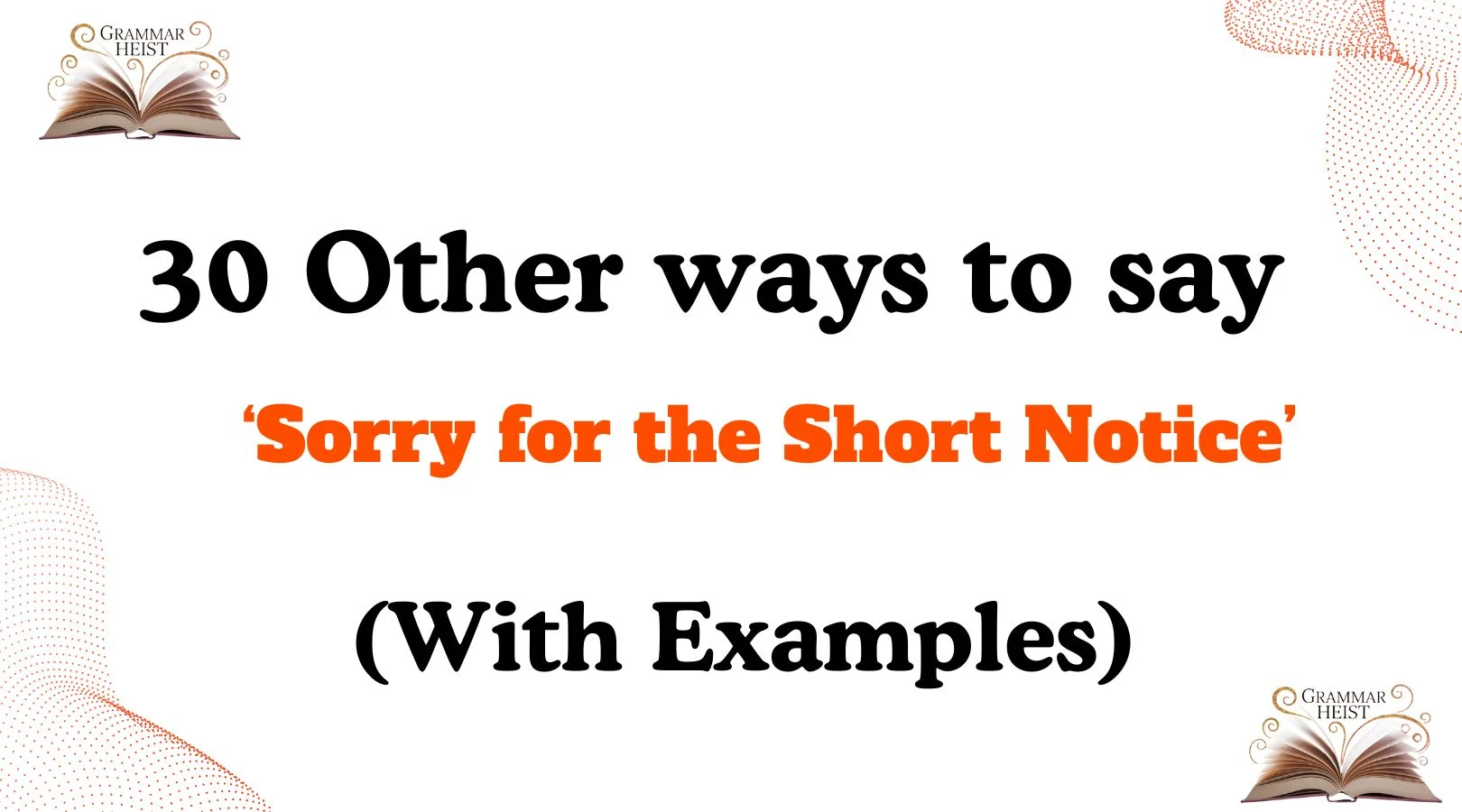Sometimes, life moves fast — plans shift, emergencies pop up, and we suddenly find ourselves needing to reach out at the last minute. Saying “Sorry for the short notice” is polite, but it can sound repetitive or overly formal. Finding warmer, more thoughtful ways to say it helps your message feel more personal and sincere. In this article, you’ll discover 30 other ways to say “Sorry for the short notice” that sound natural, kind, and professional — with real-life examples, tones, and explanations to help you choose the right one every time.
What Does “Sorry for the Short Notice” Mean?
The phrase “Sorry for the short notice” is used when you apologize for informing someone about something too close to the event or deadline. It shows respect for their time and acknowledges that your timing might be inconvenient. Essentially, it’s a polite way of saying, “I know this is sudden, and I value your understanding.”
Is It Professional/Polite to Say “Sorry for the Short Notice”?
Yes — it’s both professional and polite. However, in business or personal situations, you can use alternatives that feel more empathetic, conversational, or polished. Phrases like “I appreciate your flexibility” or “Thanks for your quick response” soften the tone while keeping it respectful.
Pros or Cons
Pros:
- Shows respect for others’ time.
- Maintains professionalism.
- Works well in emails and messages.
Cons:
- Can sound repetitive or overly formal if used often.
- Doesn’t always express genuine warmth or gratitude.
- Lacks personalization in emotional or friendly contexts.
Synonyms For “Sorry for the Short Notice”
- I apologize for the last-minute message
- Thanks for your understanding on such short notice
- I really appreciate your flexibility
- Sorry for reaching out so suddenly
- My apologies for the quick turnaround
- I hope it’s okay that this is last-minute
- Sorry for the rushed notice
- Thank you for your patience with the timing
- I realize this is a bit sudden
- I appreciate your quick response
- Sorry for not giving more time
- Thank you for accommodating this on short notice
- I know this is a last-minute change
- I’m grateful for your quick attention
- Sorry this came up so quickly
- Thank you for being so understanding
- Sorry for the sudden update
- I appreciate you adjusting so quickly
- Sorry for springing this on you
- I didn’t mean to rush this
- I know this is unexpected
- I understand this is late notice
- Thanks for being flexible
- Sorry for the delay in letting you know
- I appreciate your time despite the short notice
- Sorry I couldn’t inform you sooner
- Thank you for handling this so quickly
- I’m sorry for the quick change in plans
- I’m grateful for your prompt help
- I really appreciate your understanding about this short notice
1. I Apologize for the Last-Minute Message
Scenario: When you need to contact someone right before a deadline or meeting.
Examples:
- I apologize for the last-minute message, but could we move our meeting to 4 PM?
- I apologize for the last-minute message; something urgent just came up.
- I apologize for the last-minute message — I’ll send you the final version tonight.
Tone: Formal and respectful.
Elanation: This phrase keeps things polite and sincere while maintaining professionalism.
2. Thanks for Your Understanding on Such Short Notice
Scenario: When you need to show appreciation and politeness together.
Examples:
- Thanks for your understanding on such short notice — I truly appreciate it.
- Thanks for your understanding; I know this is very last minute.
- Thanks for your understanding and patience with the timing.
Tone: Appreciative and warm.
Explanation: This focuses on gratitude, making your apology sound genuine and kind.
3. I Really Appreciate Your Flexibility
Scenario: Ideal for work or project adjustments.
Examples:
- I really appreciate your flexibility with this sudden change.
- I really appreciate your flexibility on such short notice.
- Thanks for adjusting so quickly — I truly appreciate your flexibility.
Tone: Grateful and professional.
Explanation: This shifts focus from apology to appreciation, softening the tone.
4. Sorry for Reaching Out So Suddenly
Scenario: When you contact someone unexpectedly.
Examples:
- Sorry for reaching out so suddenly, but I needed to confirm a detail.
- Sorry for reaching out so suddenly — hope this doesn’t cause inconvenience.
- Sorry for reaching out so suddenly; thank you for responding so quickly.
Tone: Polite and gentle.
Explanation: This phrase balances sincerity with a friendly tone.
5. My Apologies for the Quick Turnaround
Scenario: Used when deadlines or decisions change fast.
Examples:
- My apologies for the quick turnaround; we just received new instructions.
- My apologies for the quick turnaround — can you review this today?
- My apologies for the quick turnaround; thank you for your effort.
Tone: Professional and understanding.
Explanation: Works perfectly in emails or formal communication.
6. I Hope It’s Okay That This Is Last-Minute
Scenario: When you want to sound polite but casual, especially in friendly or semi-formal situations.
Examples:
- I hope it’s okay that this is last-minute, but can we move our call to tomorrow?
- I hope it’s okay that this is last-minute — something urgent just came up.
- I hope it’s okay that this is last-minute, and I truly appreciate your understanding.
Tone: Friendly and sincere.
Explanation: This phrase feels gentle and caring, perfect when you want to sound considerate without being too formal.
7. Sorry for the Rushed Notice
Scenario: When you need to quickly update or inform someone about an urgent change.
Examples:
- Sorry for the rushed notice; we just got the confirmation.
- Sorry for the rushed notice — thank you for being flexible.
- Sorry for the rushed notice, I’ll make sure to give more time next time.
Tone: Polite and apologetic.
Explanation: This keeps your message short and respectful, acknowledging urgency without over-apologizing.
8. Thank You for Your Patience with the Timing
Scenario: Best for when someone has been understanding despite late communication.
Examples:
- Thank you for your patience with the timing — I truly appreciate it.
- Thank you for your patience with the timing of this request.
- Thank you for your patience; I know it’s a bit last-minute.
Tone: Appreciative and gracious.
Explanation: This turns your apology into gratitude, which feels more positive and warm.
9. I Realize This Is a Bit Sudden
Scenario: When you need to acknowledge timing gently but still sound professional.
Examples:
- I realize this is a bit sudden, but could we reschedule?
- I realize this is a bit sudden — thank you for being flexible.
- I realize this is a bit sudden, and I completely understand if it’s inconvenient.
Tone: Respectful and thoughtful.
Explanation: This phrase shows awareness of the situation while keeping empathy at the center.
10. I Appreciate Your Quick Response
Scenario: When someone helps you or replies on short notice.
Examples:
- I appreciate your quick response — thank you for being so understanding.
- I appreciate your quick response; this really helps.
- I appreciate your quick response despite the short notice.
Tone: Grateful and kind.
Explanation: Expresses genuine appreciation and shifts focus from apology to thanks.
11. Sorry for Not Giving More Time
Scenario: When you couldn’t inform someone early enough.
Examples:
- Sorry for not giving more time — things moved faster than expected.
- Sorry for not giving more time to prepare for this.
- Sorry for not giving more time, and thank you for being so patient.
Tone: Honest and caring.
Explanation: It feels direct yet gentle, showing you value the other person’s effort.
12. Thank You for Accommodating This on Short Notice
Scenario: When someone agrees to help or attend despite limited time.
Examples:
- Thank you for accommodating this on short notice — I really appreciate it.
- Thank you for accommodating this schedule change.
- Thank you for accommodating this on short notice; your support means a lot.
Tone: Appreciative and professional.
Explanation: Ideal for formal emails — it blends gratitude and politeness beautifully.
13. I Know This Is a Last-Minute Change
Scenario: When plans or meetings shift suddenly.
Examples:
- I know this is a last-minute change, but can we move the session to next week?
- I know this is a last-minute change — I really appreciate your understanding.
- I know this is a last-minute change, and I’ll make sure it doesn’t happen again.
Tone: Respectful and apologetic.
Explanation: Shows accountability while maintaining a thoughtful tone.
14. I’m Grateful for Your Quick Attention
Scenario: When someone responds swiftly to your urgent message.
Examples:
- I’m grateful for your quick attention to this matter.
- I’m grateful for your quick attention — thank you for being so responsive.
- I’m grateful for your quick attention despite the timing.
Tone: Professional and thankful.
Explanation: Perfect for emails where you want to show respect and gratitude.
Read More:30 Other Ways to Say ‘In the Text It States’ (With Examples)
15. Sorry This Came Up So Quickly
Scenario: When plans change unexpectedly and you must inform others.
Examples:
- Sorry this came up so quickly; I hope it doesn’t cause issues.
- Sorry this came up so quickly — thank you for being flexible.
- Sorry this came up so quickly; I truly appreciate your help.
Tone: Apologetic and kind.
Explanation: Softens the message and shows awareness of the sudden situation.
16. Thank You for Being So Understanding
Scenario: When someone is kind despite sudden notice or changes.
Examples:
- Thank you for being so understanding about this short notice.
- Thank you for being so understanding — I know it’s not ideal.
- Thank you for being so understanding; it means a lot.
Tone: Warm and heartfelt.
Explanation: This phrase radiates gratitude and compassion, perfect for friendly or professional settings.
17. Sorry for the Sudden Update
Scenario: When you send a quick change or correction.
Examples:
- Sorry for the sudden update — here’s the latest version.
- Sorry for the sudden update, I just got the confirmation.
- Sorry for the sudden update — thank you for your patience.
Tone: Professional and courteous.
Explanation: Keeps your tone humble and adaptable, suitable for emails or reports.
18. I Appreciate You Adjusting So Quickly
Scenario: When someone adapts fast to your request.
Examples:
- I appreciate you adjusting so quickly — you’ve been a huge help.
- I appreciate you adjusting so quickly to the schedule change.
- I appreciate you adjusting so quickly; thank you for being flexible.
Tone: Grateful and sincere.
Explanation: Puts the spotlight on the other person’s kindness and understanding.
19. Sorry for Springing This on You
Scenario: When you suddenly bring up an idea or task.
Examples:
- Sorry for springing this on you, but could we discuss this today?
- Sorry for springing this on you — it just came up.
- Sorry for springing this on you; I know it’s unexpected.
Tone: Friendly and conversational.
Explanation: Sounds relaxed and genuine, great for informal communication.
20. I Didn’t Mean to Rush This
Scenario: When you feel your message may seem hurried.
Examples:
- I didn’t mean to rush this, but the deadline moved up.
- I didn’t mean to rush this — thank you for helping so fast.
- I didn’t mean to rush this; I truly appreciate your effort.
Tone: Honest and kind.
Explanation: Makes your tone more personal and considerate.
21. I Know This Is Unexpected
Scenario: When you suddenly share new information or requests.
Examples:
- I know this is unexpected, but could we discuss it today?
- I know this is unexpected — thank you for your time.
- I know this is unexpected, and I really appreciate your patience.
Tone: Gentle and empathetic.
Explanation: Shows emotional awareness and respect for others’ time.
22. I Understand This Is Late Notice
Scenario: When you recognize that your timing isn’t ideal.
Examples:
- I understand this is late notice — thank you for your flexibility.
- I understand this is late notice, but I’d still love your input.
- I understand this is late notice, and I appreciate your understanding.
Tone: Polite and mature.
Explanation: Ideal for professional or formal messages, showing responsibility.
23. Thanks for Being Flexible
Scenario: When someone adjusts quickly to your schedule or request.
Examples:
- Thanks for being flexible with the timing.
- Thanks for being flexible; I know this was short notice.
- Thanks for being flexible and understanding about the change.
Tone: Appreciative and friendly.
Explanation: Simple, warm, and perfect for both formal and informal use.
24. Sorry for the Delay in Letting You Know
Scenario: When you couldn’t inform someone earlier.
Examples:
- Sorry for the delay in letting you know — things got busy.
- Sorry for the delay in letting you know about the meeting.
- Sorry for the delay in letting you know; thank you for understanding.
Tone: Professional and polite.
Explanation: Communicates accountability without sounding overly formal.
25. I Appreciate Your Time Despite the Short Notice
Scenario: When someone helps or attends something quickly.
Examples:
- I appreciate your time despite the short notice.
- I appreciate your time despite the short notice — you’ve been wonderful.
- I appreciate your time despite the short notice; thank you so much.
Tone: Respectful and warm.
Explanation: Perfect for thanking someone who prioritized your request.
26. Sorry I Couldn’t Inform You Sooner
Scenario: When communication was delayed unintentionally.
Examples:
- Sorry I couldn’t inform you sooner — things moved fast.
- Sorry I couldn’t inform you sooner; thank you for adapting.
- Sorry I couldn’t inform you sooner — I appreciate your patience.
Tone: Genuine and understanding.
Explanation: Shows honesty and care while maintaining professionalism.
27. Thank You for Handling This So Quickly
Scenario: When someone takes fast action on your request.
Examples:
- Thank you for handling this so quickly — it really means a lot.
- Thank you for handling this so quickly despite the short notice.
- Thank you for handling this so quickly; I truly appreciate your effort.
Tone: Appreciative and polite.
Explanation: Emphasizes gratitude instead of apology, making it positive.
28. I’m Sorry for the Quick Change in Plans
Scenario: When you must rearrange plans suddenly.
Examples:
- I’m sorry for the quick change in plans — I hope this still works for you.
- I’m sorry for the quick change in plans; thank you for adjusting.
- I’m sorry for the quick change in plans; it was unexpected.
Tone: Apologetic and kind.
Explanation: A natural and gentle way to acknowledge last-minute plan shifts.
29. I’m Grateful for Your Prompt Help
Scenario: When someone assists quickly after sudden notice.
Examples:
- I’m grateful for your prompt help on this short notice.
- I’m grateful for your prompt help — you’re a lifesaver.
- I’m grateful for your prompt help; thank you for jumping in.
Tone: Appreciative and uplifting.
Explanation: This phrase makes your message feel warm and full of gratitude.
30. I Really Appreciate Your Understanding About This Short Notice
Scenario: When you need to combine both apology and appreciation.
Examples:
- I really appreciate your understanding about this short notice.
- I really appreciate your understanding — thank you for being kind.
- I really appreciate your understanding about this situation.
Tone: Grateful and compassionate.
Explanation: It wraps sincerity, empathy, and gratitude into one perfect phrase.
🌿 Conclusion
Finding other ways to say “Sorry for the short notice” helps you express care and respect while keeping your message positive and personal. Whether it’s a quick work email or a last-minute text to a friend, using words that show empathy and gratitude makes a lasting impression. The next time you’re in a hurry, choose one of these thoughtful alternatives — and let your kindness shine through every word.

Emma Brooke is a passionate advocate for effective communication and language mastery. As a dedicated professional in the field of grammar and writing, Emma brings a wealth of knowledge and expertise to those seeking to improve their linguistic skills. With a focus on clarity, precision, and style, Emma Brooke is committed to helping individuals refine their language use to communicate confidently and effectively.












